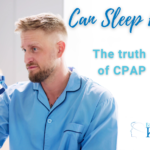If you’ve been diagnosed with obstructive sleep apnea (OSA), you may be wondering what your treatment options are. Traditionally, many doctors have prescribed what is known as continuous positive airway pressure therapy, or CPAP.
CPAP is a highly effective treatment for sleep apnea. However, it has its drawbacks. In fact, CPAP therapy can even be dangerous. Here are just a few dangers of CPAP and reasons why CPAP therapy may not be for you – and why you may want to consider a safe, effective solution from Dr. Mingus.
The Dangers of CPAP for Treating Sleep Apnea
There are several negative factors about CPAP that you will want to consider before choosing it as a treatment method. These include:
1.) Discomfort
CPAP therapy can be uncomfortable for some people, which means, in all likelihood, they won’t follow through with their treatment. This, of course, renders it useless, which can be very dangerous.
2.) Skin Irritation and Pressure Wounds
For some users, their CPAP mask can cause skin irritation, pressure sores and rashes. This is common when the mask is too tight or improperly fitted to your face.
3.) Dry Mouth or Nose
When it comes to your oral health, it is essential to keep your mouth moisturized, as this helps wash away plaque bacteria that could cause cavities and gum disease. When you use CPAP therapy, you might find your mouth quickly dries out as you sleep.
Your CPAP machine can also cause your sinuses to dry out, leading to nasal congestion or a sore throat.
4.) Claustrophobia
If you are at all claustrophobic, you may be afraid to wear your CPAP mask, as the mask covers much of your face as you sleep. Unfortunately, this is yet another reason many people do not use their CPAP as prescribed.
5.) Air Swallowing and Bloating
Because your CPAP machine uses forced air pressure to open your airway, it can cause you to swallow air, which can, in turn, lead to gas, stomach discomfort and bloating.
6.) Mask Leaks
If your CPAP mask isn’t fitted correctly, or if your mask shifts during the night, it could leak air, making it less effective than it should be.
7.) Noise
Sometimes, CPAP machines can be very noisy, which can not only keep the user up at night, but can also disrupt the sleep of anyone in the room with them. This can affect cognitive function during the day.
8.) Allergies and Infections
If you use a CPAP machine, you must clean it frequently or risk infection due to bacteria, mold and other allergens that may accumulate in the machine. This contamination can cause respiratory infections and allergies.
9.) Eye Irritation
Because CPAP masks sometimes leak air, they can cause eye irritation from the forced air leaking out.
10.) Cardiovascular Issues
Though it is rare, CPAP therapy can cause changes in blood pressure. Generally speaking, it has positive effects on cardiovascular health.
11.) Nasal Congestion
For those who already have nasal or sinus problems, CPAP can worsen these issues.
Treating Sleep Apnea Without CPAP
Thankfully, if you’ve decided that CPAP therapy is not for you, there are other options besides CPAP for treating your obstructive sleep apnea (OSA). Dr. Mingus offers sleep apnea solutions that can help you avoid CPAP therapy with the use of a custom sleep orthotic.
Sleep orthotic devices are custom fit to your individual mouth and rest comfortably inside the mouth. The goal of these orthotic devices is to prop the airway open as you sleep so you can breathe more efficiently without the need for forced air.
Because sleep orthotics go directly into the mouth, they are easier to manage. Sleep orthotics are also easier to clean. In fact, you can clean them every single day the same way you’d clean a mouth guard or retainer.
Sleep orthotics require no electricity, tubing or machinery to operate, eliminating instances of user error. Sleep orthotics are also easier to travel with, especially if you will be camping or somewhere that does not have electricity or a USB plug.
Sleep orthotics do not use forced air, which means they cannot leak air and cause irritation to your eyes, mouth or sinuses. They are generally considered more comfortable to most users, and therefore, they are more likely to be used by the patient, rendering them more effective and have less dangers of CPAP therapy.
If you are interested in learning more about a sleep orthotic device from Dr. Mingus at Bend Headache Center, please contact the office today to schedule a consultation and discuss your options.

